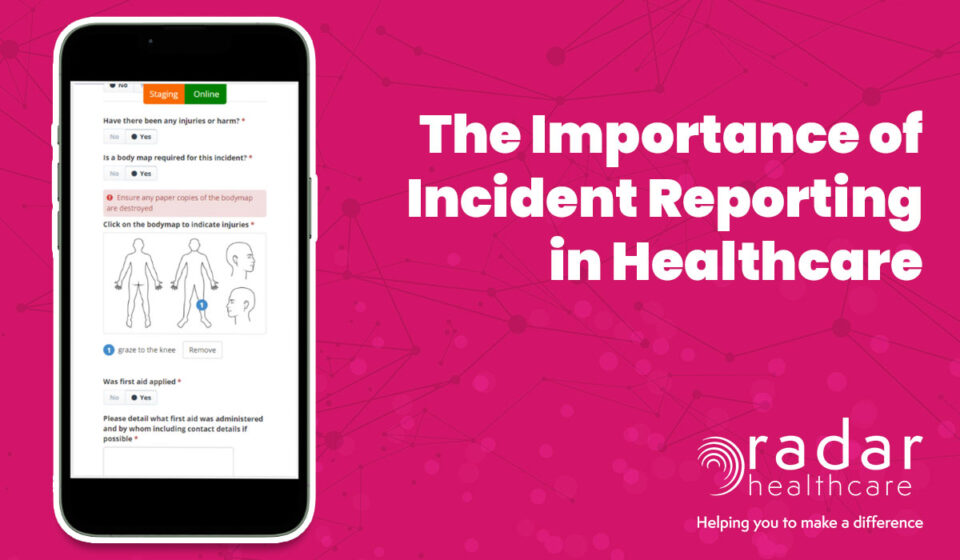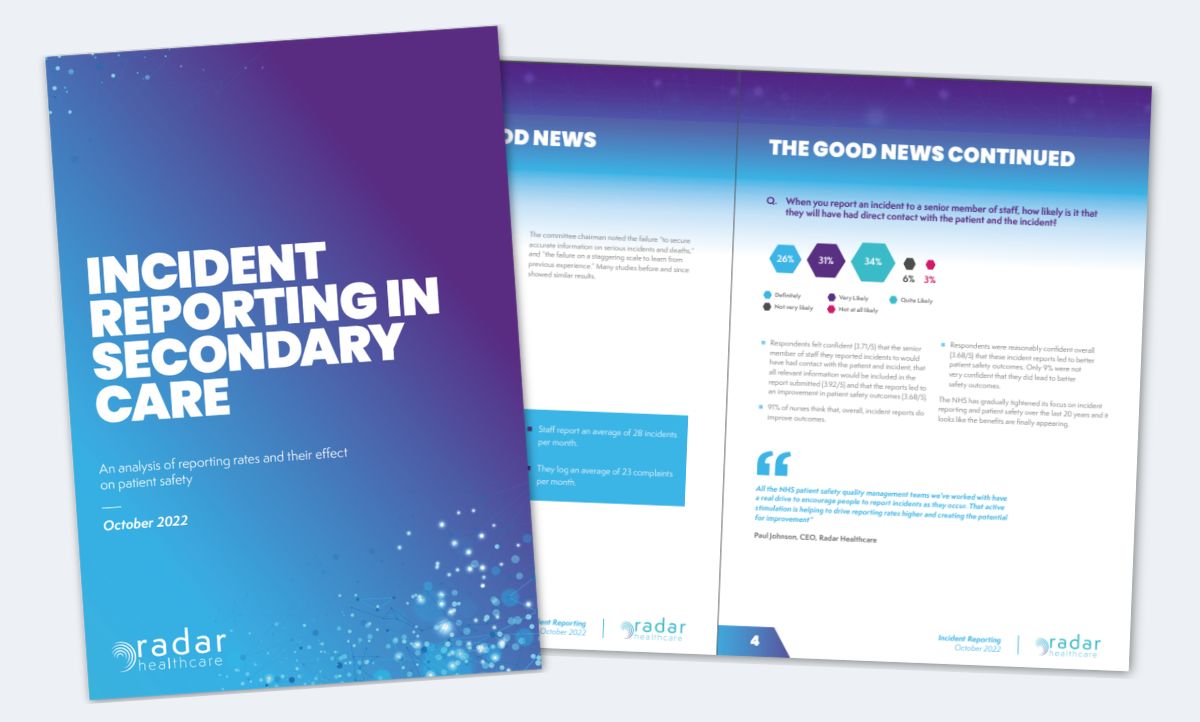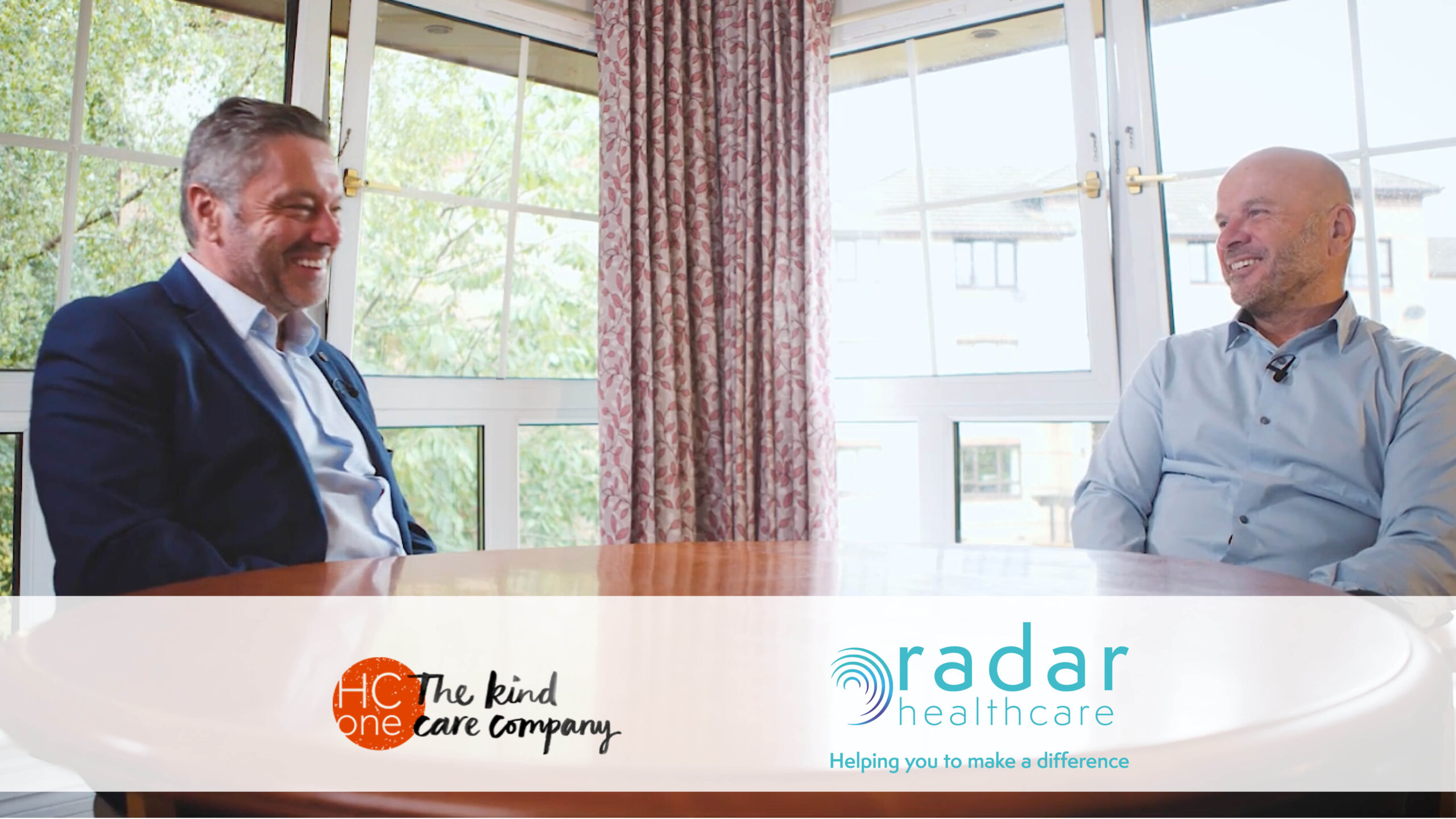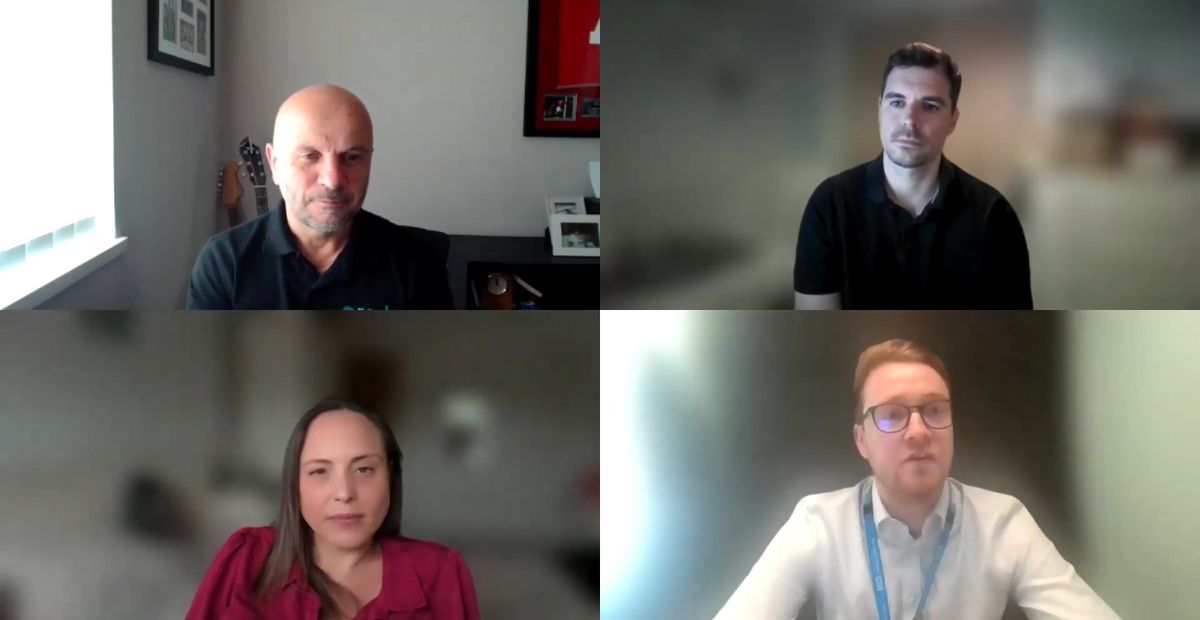The Importance of Incident Reporting in Healthcare
Tags:
The Importance of Incident Reporting in Healthcare: Enhancing Patient Safety and Organisational Learning
Incident reporting is a fundamental aspect of health and social care organisations across the UK, serving as a vital tool for improving patient safety, care quality, and organisational learning.
By systematically documenting and analysing incidents—ranging from near-misses to adverse events—healthcare providers can identify patterns, uncover root causes, and implement strategies to prevent reoccurrence. However, the scope of incident reporting should not be limited to just adverse events; it should also include learning from excellence and capturing positive feedback.
This article explores the critical role of incident reporting in healthcare, the benefits it brings to organisations, and how Radar Healthcare’s Incident Management Software can support these processes.

Understanding the Importance of Incident Reporting in Healthcare
1️⃣ Enhancing Patient Safety
Incident reporting directly contributes to enhancing patient safety by allowing healthcare providers to capture and analyse data relating to events and near-misses.
By reporting incidents, healthcare professionals can:
- Identify Risks: Detect potential hazards that could compromise patient safety.
- Prevent Future Errors: Implement corrective actions to prevent the reoccurrence of similar incidents.
- Improve Care Quality: Continuously refine practices to ensure the highest standards of care.
2️⃣ Promoting a Culture of Transparency
A robust incident reporting system fosters a culture of transparency within healthcare organisations. When staff members feel safe to report incidents without fear of blame or repercussion, it encourages open communication and collective problem-solving.
3️⃣ Facilitating Organisational Learning
Incident reporting is a valuable tool for organisational learning. By analysing incident reports, organisations can identify trends, uncover root causes, and implement system-wide changes. This continuous learning process is essential for driving improvement in patient safety and care quality.
4️⃣ Compliance with Regulatory Requirements
Health and social care organisations are often required to report certain types of incidents to regulatory bodies such as the CQC. Incident reporting systems ensure that organisations remain compliant with these requirements, avoiding potential legal and financial consequences.
“One of the main drivers for transitioning to digital processes was the ability to be able to properly analyse data, spot trends, and then learn from this and make decisions based on the results. Without a solution that automatically manipulates data for you, reporting on what is working well and understanding what could do with improvement becomes difficult, very labour intensive, and potentially inaccurate.
Having one solution that centrally stores everything from our audits, incidents, events, improvement plans, and more, not only increases visibility, improves efficiency, and is financially savvy, but it frees up our operational staff’s time, allowing them more time to do their primary role of providing excellent care and support to our residents.”
Expanding the Scope: Learning from Excellence and Positive Feedback
While incident reporting is often associated with accidents or adverse events, it is equally important to recognise and learn from instances of excellence and positive feedback.
By broadening the scope of reporting to include positive outcomes, healthcare organisations can:
Reinforce Best Practices
Reporting and analysing instances of excellence allow organisations to identify and reinforce best practices. By understanding what works well, healthcare providers can replicate successful strategies across the entire organisation.
Boost Staff Morale
Recognising and celebrating positive outcomes not only boosts staff morale but also encourages a culture of continuous improvement. It reminds healthcare professionals that their efforts are valued and contributes to a more engaged workforce.
Balance the Narrative
Including positive feedback alongside incident reporting provides a more balanced view of organisational performance. This holistic approach helps to ensure that both challenges and successes are recognised, leading to more comprehensive learning and improvement.
Radar Healthcare’s Events Module is designed to facilitate this broader approach to reporting. Whether it’s an incident, a positive outcome, or an innovative idea, the system allows staff to capture and analyse all types of events, fostering a culture of continuous learning and improvement.
We are really keen to share our experiences to help other organisations deliver better care for patients. We are not just ticking a box for CQC, we genuinely care about what we do and creating the best possible outcomes for patients. Radar Healthcare helps us to do that by shared learning, learning from excellence and highlighting how we have dealt with any issues.

Why Is Incident Reporting Important in Healthcare?
Incident reporting is more than just a regulatory obligation; it is a fundamental component of a high-performing healthcare organisation. Here’s why:
👍 Building a Safer Environment
Incident reports provide critical insights into areas where patient safety or resident care may be at risk. By addressing these issues proactively, organisations can create a safer environment for both patients, residents, and staff.
🔄 Driving Continuous Improvement
By systematically reviewing incidents and positive events, healthcare organisations can implement changes that lead to continuous improvement. This might involve revising protocols, enhancing staff training, or investing in new technologies that reduce the likelihood of future incidents.
💪 Empowering Healthcare Professionals
A strong reporting culture empowers healthcare professionals to speak up when they see something wrong or right. This not only helps to prevent harm but also fosters a sense of ownership and responsibility among staff.
🤝 Strengthening Trust with Patients/Residents
When health and social care organisations are transparent about incidents and committed to learning from them, it builds trust with patients or residents and their families. This trust is crucial for maintaining a positive relationship with the communities they serve.
How Radar Healthcare Can Help with Incident Reporting and Learning from Excellence
Radar Healthcare’s Incident Management Software is designed to streamline the process of reporting, analysing, and learning from not only accidents and incidents but positive events and feedback.
1️⃣ Simplified Reporting Process: Radar Healthcare’s system allows for easy and intuitive incident reporting. Staff can quickly log incidents or positive outcomes in real-time and on any device, ensuring that no detail is missed. As Antony Hall, Director of Regulations at HC-One, explains, “When a resident falls, the caregiver records the incident on a handheld device, which then updates Radar Healthcare.”
2️⃣ Comprehensive Data Analysis: Our software provides powerful analytics tools to help organisations identify trends, root causes, and best practices. This allows for more informed decision-making and targeted interventions to improve patient safety and care quality.
3️⃣ All-In-One Solution: Radar Healthcare’s Incident module integrates seamlessly with our other modules, such as the Risk module and Audits module, providing a holistic view of organisational performance. This full picture view is key to driving continuous improvement and ensuring compliance with regulatory bodies and frameworks like the Patient Safety Incident Response Framework (PSIRF) or Learning From Patient Safety Events (LFPSE).
4️⃣ Customisable Workflows: The system is highly customisable, allowing organisations to tailor workflows to their specific needs. This flexibility ensures that the software can adapt to the unique challenges and requirements of different healthcare settings.
5️⃣ Integrated Action Plans: Radar Healthcare’s action plan feature allows organisations to build actionable steps directly into their incident reporting workflows. Once an incident is reported or a positive outcome is identified, healthcare teams can immediately create and assign action plans within the system.
These plans can include tasks, deadlines, and responsibilities, ensuring that follow-up actions are clearly defined and tracked. This integration not only streamlines the process of addressing incidents but also facilitates ongoing improvements by ensuring that lessons learned are translated into concrete actions. By embedding action plans into the workflow, Radar Healthcare helps organisations to close the loop on incident management and maintain a continuous cycle of learning and development.
Conclusion
Incident reporting, when expanded to include learning from excellence and positive feedback, is indispensable in healthcare. It plays a crucial role in enhancing patient safety, promoting transparency, and driving continuous improvement.
By leveraging advanced tools like Radar Healthcare’s Incident Management Software, healthcare organisations can optimise their reporting processes, ensure compliance, and ultimately deliver better care. As the healthcare landscape continues to evolve, the importance of a comprehensive and balanced reporting system will only grow, making it a key component of any successful healthcare organisation.











